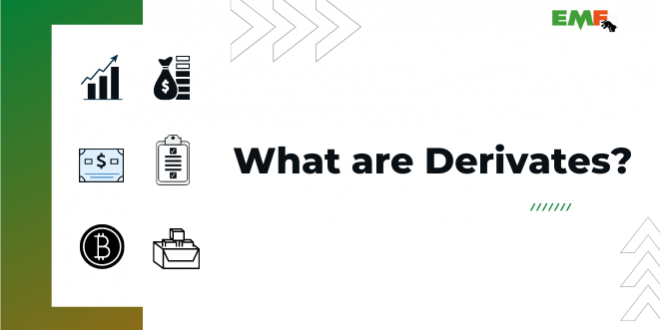Financial Derivatives are contracts binding two parties that enter into a commitment to hand over a pre-agreed asset (or a pre-agreed derivative value) at the predetermined time and the preset price.
There are several types of underlying assets; they can be a financial asset, an index (a set of investments), security, or even an interest rate.
The purchaser agrees to buy the specific asset on the predetermined date at the preset price.
Notably, a derivative’s seller doesn’t have to be the owner of an underlying asset, as they can deliver on the contract by simply providing a purchaser with enough money to buy the agreed-upon asset at the specific price.
Derivatives are usually traded on specialized exchanges, with some of them being traded off-exchange or over-the-counter (OTC).
Types and Classes of Derivatives
Derivative products can be separated into lock products (e.g., swaps) and options (e.g., stock options).
- Lock products seal the deal between the corresponding parties from the outset to the negotiated terms during the contract’s life.
- Option products provide the holder with the right (without any obligations) to trade the underlying asset at a specific contract price on or before the option expires.
As we have already mentioned above, a derivative’s value is based on an asset; however, it doesn’t mean that you own the buy itself if you own a derivative.
The most common types of derivatives are futures, forwards, options, swaps, and warrants. Let’s learn a bit more about them.
Forwards vs. Futures
A forward, also known as a forward contract, is a customized private agreement between two respective parties that are concluded to buy or sell an underlying asset at an agreed-upon price on a specific date.
Forwards are frequently used for either hedging or speculation, though their non-uniform nature makes them a perfect tool tailored for hedging.
Forwards and futures have a lot in common, yet they are not perfectly alike.
Both are based on the agreement to buy and sell some assets at the preset date; their prices are derived from corresponding underlying assets.
Warrants
A warrant is a financial derivative that the company itself issues, providing its owner with the right (without any obligations) to trade securities — usually equities — at an agreed-upon price before the given expiration date.
Issuing warrants by a third party and are often OTC-traded.
The prevailing price of the underlying security is called an exercise price or a strike price, and once a warrant is exercised, an underlying stock must be delivered.
Options
An option shares some common traits with a warrant, as it also grants the purchaser the right (without any obligations) to buy or sell the underlying asset at a preset price.
However, options don’t have to be issued by a company; they are typically contracts that are traded between two people without any business entity being involved.
Another distinctive feature of an option contract is that the contracting parties are not required to honor the agreement to purchase or sell the asset.
An option is known as “an opportunity,” while a future is always “an obligation.”
Swaps
Swaps are the most widespread and tradable derivatives. A swap is a brief exchange of assets (currency, securities, stocks, etc.) in trading on an exchange.
The main feature of a swap is that the exchange is transitory; the parties to the transaction will have to return their assets to each other within the stated period.
Swaps drive out potential risks and enable investors to access the overall markets that operate under different jurisdictions.
Most swaps are either based on currencies or variable interest rates. Investors frequently use swaps as a hedging tool to alleviate potential risks.
For instance, a person can sell stocks in one country and then buy them in a foreign currency to hedge the existing currency risks.
 Earn Money Forex Best Forex Trading Experience
Earn Money Forex Best Forex Trading Experience








